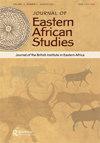Wealth and poverty in mining Africa: migration, settlement and occupational change in Tanzania during the global mineral boom, 2002–2012
IF 0.6
3区 社会学
Q2 AREA STUDIES
引用次数: 0
Abstract
ABSTRACT This article interrogates place, process and people’s quest for enhanced welfare during the 2002–2012 global mineral price boom in northwest Tanzania. Mass in-migration of miners, traders and service providers generated diversified residential settlements. Processes of occupational change and urbanization, catalyzed by acquisition of employment, land, housing and other possessions at six contrasting mining locations were compared from a geo-social perspective. Our surveyed gold and diamond mining sites represented different manifestations of the mining trajectory namely: (1) artisanal rushes, (2) mature artisanal and (3) industrial mining. The article investigates who benefitted locationally and who lost in residents’ scrambles to gain improved living standards. Survey data on 216 household heads’ occupations, educational backgrounds, consumption and investments were collected, followed by construction of a household welfare index, revealing modest welfare improvements relative to rural consumption norms for the majority of interviewed resident households. However, in line with Picketty’s theoretical insights, extreme material inequality surfaced on the welfare spectrum between the outlier affluent and poor quintile groups. Those with higher educational attainment enjoyed superior welfare and occupational status, coalescing towards middle class formation. At the opposite end, single female-headed households stood out as extremely disadvantaged, handicapped by high child dependency ratios and occupational immobility.非洲采矿业的财富与贫困:2002-2012年全球矿业繁荣期间坦桑尼亚的移民、定居和职业变化
本文章由计算机程序翻译,如有差异,请以英文原文为准。
求助全文
约1分钟内获得全文
求助全文
来源期刊

Journal of Eastern African Studies
AREA STUDIES-
CiteScore
3.30
自引率
7.10%
发文量
12
期刊介绍:
Journal of Eastern African Studies is an international publication of the British Institute in Eastern Africa, published four times each year. It aims to promote fresh scholarly enquiry on the region from within the humanities and the social sciences, and to encourage work that communicates across disciplinary boundaries. It seeks to foster inter-disciplinary analysis, strong comparative perspectives, and research employing the most significant theoretical or methodological approaches for the region.
 求助内容:
求助内容: 应助结果提醒方式:
应助结果提醒方式:


